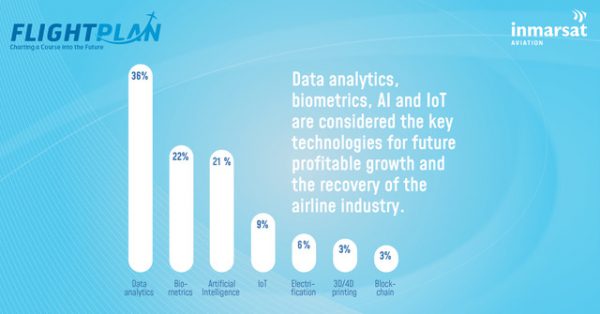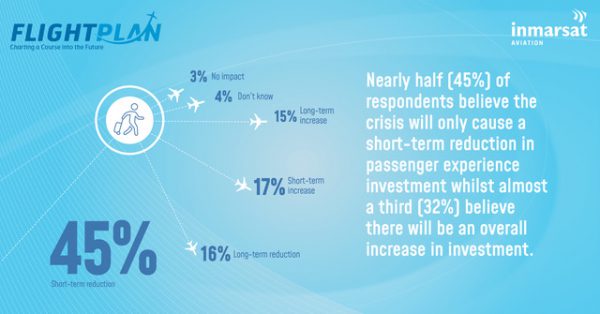SINGAPORE, 20 July 2020: A major industry poll of professionals from across the global aviation industry reached a consensus that widespread recovery of the industry could be up to three years away.
That was the consensus from a major industry poll conducted as part of FlightPlan: Charting a Course into the Future, an online broadcast by Inmarsat and the Airline Passenger Experience Association (APEX).

The poll reached out to 500 professionals globally.
Despite predicting a slow recovery over three years, the research presented a sense of optimism for the industry’s future, with digitization in the form of data analytics, AI and IoT expected to drive the return to profitable growth.
More than half of respondents (60%) expect a recovery period between 18 months to three years.
Almost nine in 10 (85%) predict that domestic travel will recover quicker than international travel.


Seven out of 10 respondents expect point-to-point travel will bounce back quicker than hub and spoke routes, with low-cost carriers (LCCs) expected to recover more quickly than full-service carriers.
Government support
Despite bailouts from many governments, only 7% of respondents believe governments have uniformly done enough to support the industry.
Post-COVID-19 reality
Contactless catering was highlighted by 57% as being important during the recovery period.
Half of the respondents (45%) believe that in terms of passenger experience, the crisis will only cause a short-term reduction in investment, and almost a third (32%) believe there will be an overall increase in investment.
Asia Pacific’s domestic aviation sector has proved to be resilient amid the Covid-19 crisis. Countries in the region account for half of the top 20 domestic aviation markets as of early July, according to travel data analytics provider Cirium, with Vietnam, Indonesia and South Korea the only countries in the world to show growth in domestic air travel in July.
This supports recent guidance by the International Air Transport Association (IATA) that rising flight volumes have been driven by the recovery in some domestic markets, most notably China.
While these are reasons to remain optimistic, airlines will have to continue to make flight safety and hygiene a long-term and sustained priority.
Passenger journeys
New health and safety guidance from aviation industry bodies such as APEX and IATA – including enhancing the traceability of customers and establishing clear aircraft decontamination procedures – has driven necessary changes to passenger journeys. The poll finds such developments are set to continue as the industry rebounds.
As a result of deeper cleaning measures, nine in 10 (88%) expect slower turnarounds, which could have a significant impact on flight schedules. Contactless catering was highlighted by 57 per cent as being important during the recovery period, and almost half (44%) expect to see empty middle seats as a standard feature of the passenger journey in the coming months despite contrary guidance given by IATA in May.






